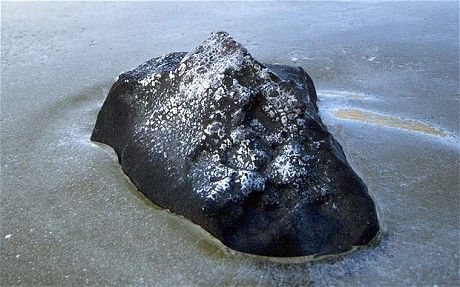
Astrobiologist Dr Terry Kee, from the University of Leeds, has found meteorite fragments contain a precursor to a key chemical that allows biological cells to capture energy from their surroundings.
He believes debris from meteorites that hit the Earth billions of years ago may have combined with slightly acidic water on the planet to produce early forms of the compound.
This would then have allowed the first forms of cellular life to form and to use energy from their surroundings.
"There is strong scientific evidence that chemicals essential to life have been found in interstellar material such as meteorites," Dr Kee said.
"Meteorites are fragments of some of the oldest materials in our solar system, and their composition can hold clues as to the appearance and environment of our own planet and what lived on it billions of years ago."Dr Kee will present his findings to the British Science Festival on Wednesday 14th September as part of the Astrobiology: Life in Other Worlds event.
He and his research team found that when iron-based meteorites were dissolved in slightly acidic water, compounds called phosphates were formed.
After being subjected to heat of around 80 degrees, the phosphate compounds covert to pyrophosphate, which Dr Kee believes is a precursor of adenosine triphosphate (ATP), a molecule essential for respiration in cellular life forms.
ATP allows all living cells to convert the chemical energy stored in sugar so it can be used to drive processes in the cell.
Dr Kee says the high reactivity of pyrophosphate suggests that it fostered early chemical reactions in the acidic, warm pools that surrounded volcanoes.
He said:
"The application of acidic water and heat to the meteorites mimics the conditions of ancient planet earth's surface.Dr Kee is distancing himself from claims from NASA scientist Richard Hoover, who has claimed to have discovered extraterrestrial microfossils in a collection of meteorites three times in the last 14 years.
"If corroded by acid rain, the chemical pyrophosphate would be released from the meteorite into the earth itself. This may suggest the origins of chemical cycles and cell formation on the early earth."
He said:
"We're not attempting to prove the existence of extraterrestrial life forms as such; we are concentrating upon the origins of earth's chemical processes, and why they evolved into life forms as they did.
"We believe that life did not evolve independently.
"There is a very good chance that extraterrestrial materials provided the building blocks of life on earth."



I personally think this whole approach to the origins of life on earth is a bit retarded. But I can understand why these researchers are so serious about their work. I was there once.
But I'm not there any more. So: Why are they? This isn't even the first such announcement from the scientific community. There have been many studies that found organic compounds in materials originating off-planet.
The data we have collected on this subject is so far away from the data they have collected on this subject, that they don't even know that our data are on the same chart. But I know about their data. Why don't they know about mine? It seems unfair somehow.